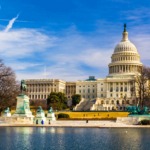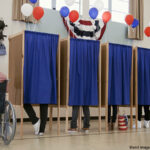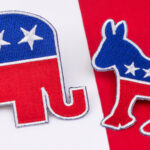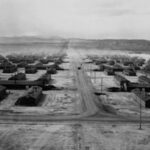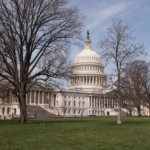The Republican Party and the Democratic Party officially nominate their candidates for president and vice president at national conventions. Every four years, during a presidential election cycle, the national party organizations choose a city and hold a multi-day convention to present the political issues and candidates that define the political party.
Delegates to the national conventions are selected according to the rules determined by each political party’s state committee. There are two ways by which the states select their delegates: the caucus and the primary.
Caucuses and Primaries
Caucuses are meetings, open to all registered voters of the party, where voters decide which candidate to support. Caucuses are unique in that they encourage taking part in the process. Voting is often done by raising hands or dividing into groups to show support for a particular candidate.
Some states rely on the caucus, but most states hold state-wide primary elections. In a primary, voters cast secret ballots for the candidates. Each state sets a date and holds its own primary elections, starting with New Hampshire in early January. The first primary was held in North Dakota in 1912.
There are two types of primaries: closed and open. Most states hold a closed primary, in which only the declared members of a party are allowed to vote for that party’s nominees. For example, only Republicans can vote in the Republican Party’s primary. A few states hold an open primary, in which voters do not need to declare their party preference in order to vote for the party’s nominees
Rules for how voters declare their party affiliation vary by state. In some states you must declare your party when you register. In others, you do not have to declare your party preference until you actually vote.
National Conventions
In addition to the Republican and Democratic parties, third parties also hold nominating conventions. The first national political convention ever was held in Baltimore and hosted by a third party—the Anti-Masonic Party—in 1831.
In the early years of the nation, candidates were usually nominated by a caucus of members of Congress. With a national convention, average citizens played an important role in the selection process.
Of Primary Importance
Increasingly, the state primaries and caucuses have greatly shaped the presidential general election. As candidates criss-cross the nation speaking to voters and trying to gain delegates, the number of competing candidates is trimmed down. Each state’s voters have tried very hard to make sure that their issues and opinions help determine which candidate will represent their party at the national convention. And for this reason, states have tried to move their state’s schedule primary vote earlier and earlier to ensure that they have a say in the choosing of a candidate.
While it may seem obvious that more populated states have an advantage in selecting the candidates, smaller states that vote early often have a big effect. For example, President Truman ended his re-election campaign in 1952 after losing the New Hampshire primary and President Lyndon Johnson also ended his 1968 reelection bid after performing far below expectations in the New Hampshire primary.




